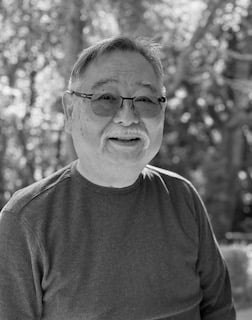Something Whispered in the Shakuhachi
No one knew the secret of my flutes, and I laugh now because some said I was enlightened. But the truth is I'm only a gardener who before the War was a dirt farmer and learned how to grow the bamboo in ditches next to the fields, how to leave things alone and let the silt build up until it was deep enough to stink bad as night soil, bad as the long, witch-grey hair of a ghost. No secret in that. My land was no good, rocky, and so dry I had to sneak water from the whites, hacksaw the locks off the chutes at night, and blame Mexicans, Filipinos, or else some wicked spirit of a migrant, murdered in his sleep by sheriffs and wanting revenge. Even though they never believed me, it didn't matter--no witnesses, and my land was never thick with rice, only the bamboo growing lush as old melodies and whispering like brush strokes against the fine scroll of wind. I found some string in the shed or else took a few stalks and stripped off their skins, wove the fibers, the floss, into cords I could bind around the feet, ankles, and throats of only the best bamboos. I used an ice pick for an awl, a fish knife to carve finger holes, and a scythe to shape the mouthpiece. I had my flutes.
*
When the War came, I told myself I lost nothing. My land, which was barren, was not actually mine but leased (we could not own property) and the shacks didn't matter. What did were the power lines nearby and that sabotage was suspected. What mattered to me were the flutes I burned in a small fire by the bath house. All through Relocation, in the desert where they put us, at night when the stars talked and the sky came down and drummed against the mesas, I could hear my flutes wail like fists of wind whistling through the barracks. I came out of Camp, a blanket slung over my shoulder, found land next to this swamp, planted strawberries and beanplants, planted the dwarf pines and tended them, got rich enough to quit and leave things alone, let the ditches clog with silt again and the bamboo grow thick as history.
*
So, when it's bad now, when I can't remember what's lost and all I have for the world to take means nothing, I go out back of the greenhouse at the far end of my land where the grasses go wild and the arroyos come up with cat's-claw and giant dahlias, where the children of my neighbors consult with the wise heads of sunflowers, huge against the sky, where the rivers of weather and the charred ghosts of old melodies converge to flood my land and sustain the one thicket of memory that calls for me to come and sit among the tall canes and shape full-throated songs out of wind, out of bamboo, out of a voice that only whispers.
Credit
From Yellow Light by Garrett Hongo, published by Wesleyan University Press. Copyright © 1982 by Garrett Hongo. Reprinted by permission of Wesleyan University Press. All rights reserved.
Date Published
01/01/1982

